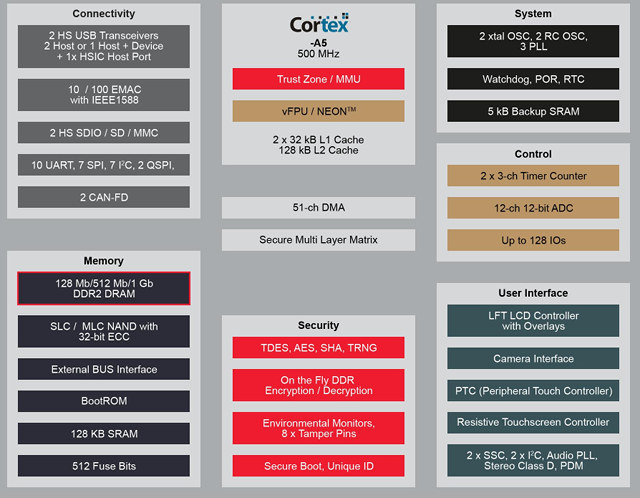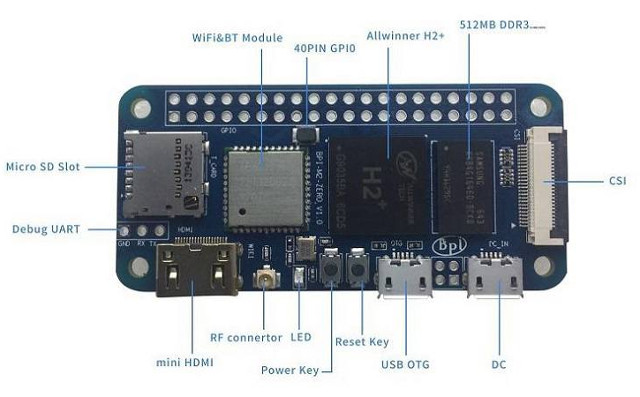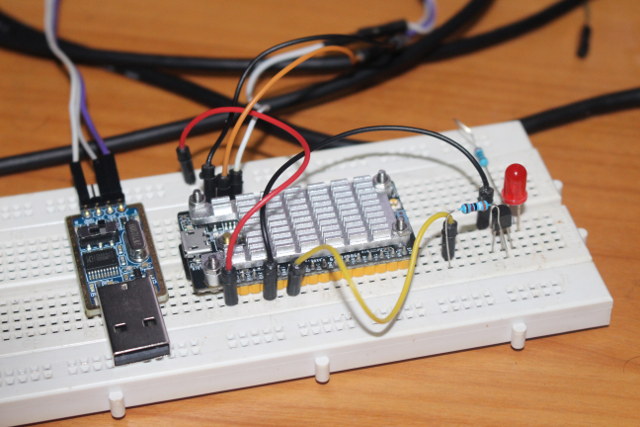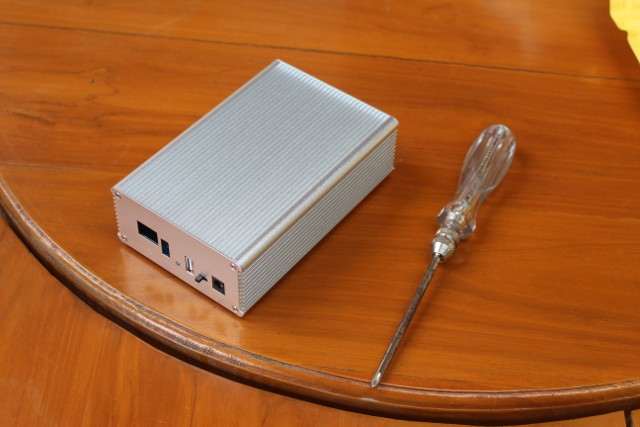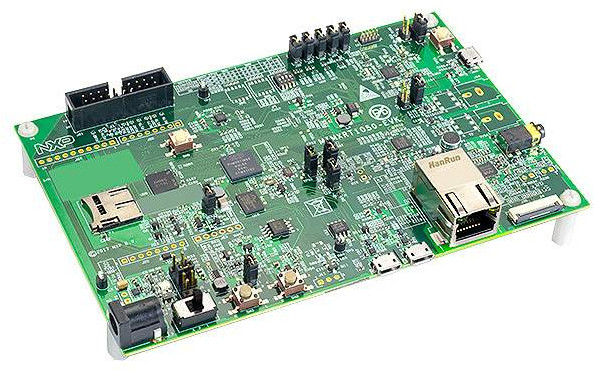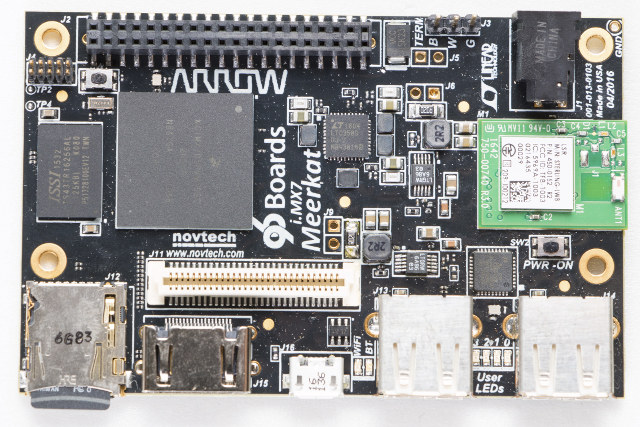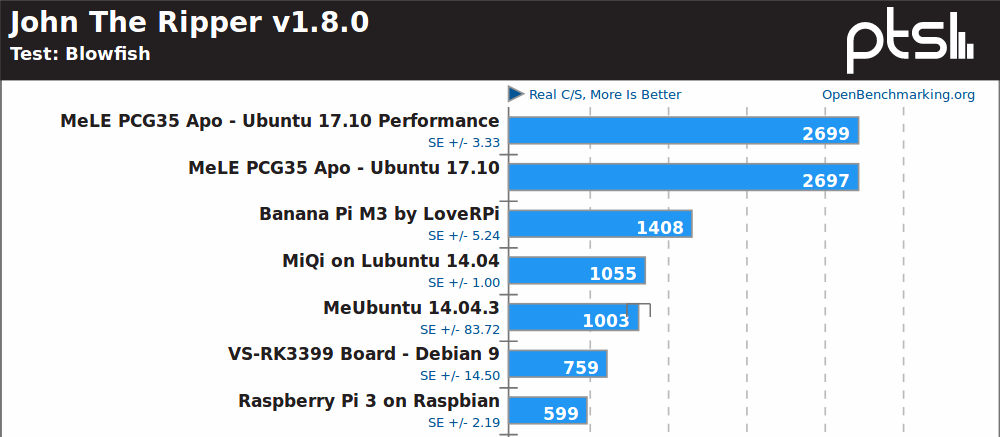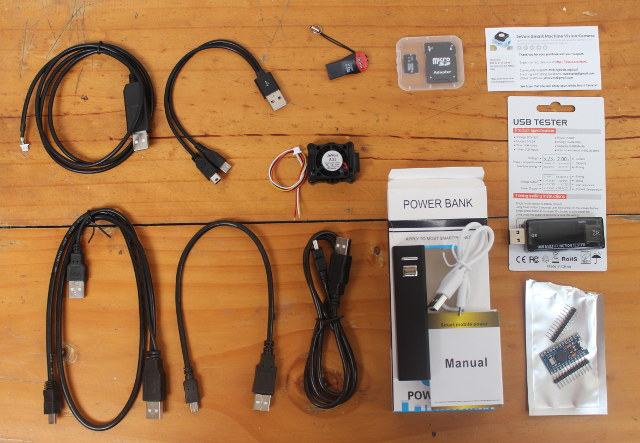Atmel SAMA5D2 ARM Cortex-A5 processor was released about two years ago with extended temperature range and lower power consumption compared to previous SAMAD5 processors, with the new SoC still targeting industrial Internet of Things (IIoT), wearables and point of sale applications. In recent years, we’ve seen companies packing main components into systems-in-package (SiP) with products such as Octavo Systems OSD3358 and Espressif Systems ESP32-PICO-D4 with integrate an existing processor with memory, storage, and/or PMIC. Microchip (previously Atmel) has now done the same for their SAMA5D2 processors with SiPs combining the Cortex A5 SoC with DDR2 memory. Four SAMA5D2 SiPs have been launched: ATSAMA5D225C-D1M based on ATSAMA5D22C MPU with extra SD/SDIO, QSPI, FLEXCOMs (2x), I2S, and timers (2x) and: 128 Mb (16 MB) DDR2 DRAM 90 Peripheral I/Os 196 BGA Package Designed for RTOS/bare metal development ATSAMA5D27C-D5M based on ATSAMA5D27C MPU with: 512 Mb (64 MB) DDR2 DRAM 128 Peripheral I/Os […]
$15 Banana Pi M2 Zero Board is a Raspberry Pi Zero W Clone with a Quad Core Processor
Many development boards have followed Raspberry Pi 2/3 form factor in recent years, including Hardkernel ODROID-C2 and Pine64 ROCK64, but so far I had not seen any boards leveraging Raspberry Pi Zero (W) form factor. SinoVoIP will change that, as they’ve just launched Banana Pi M2 Zero (aka BPI-Zero) board powered by Allwinner H2+ quad core processor, leveraging Raspberry Pi Zero W form factor, and now selling on Aliexpress for $15 plus shipping. Banana Pi M2 Zero specifications: SoC – Allwinner H2+ quad core Cortex A7 processor @ up to 1 GHz with Mali 400MP2 System Memory – 512 MB DDR3 Storage – micro SD card slot up to 64GB Video/Audio Output – mini HDMI Connectivity – 802.11 b/g/n WiFi and Bluetooth LE (AP6212 module with options for AP6181, AP6335) Camera – 1x MIPI CSI connector supporting 8-bit YUV422 CMOS sensor, CCIR656 protocol for NTSC and PAL, 5MP camera, 1080p […]
NanoPi Duo Quick Start Guide – Ubuntu, Breadboard, Mini Shield & mSATA SSD
As far as I know NanoPi Duo is the only quad core ARM Linux development board that can fit on a breadboard. We’ve already seen it’s much smaller than Raspberry Pi Zero, and the company offer a mini shield exposing USB ports, Ethernet, a few I/Os, and an mSATA slot in in NanoPi Duo Starter Kit Review – Part 1: Unboxing and Assembly. I’ve finally played with it this week-end, and will report what I had to do to blink a LED when connected to breadboard, and my experience using the mini shield with an mSATA SSD, WiFi connectivity, and cooling under load. Flashing Ubuntu 16.04.2 firmware image to NanoPi Duo As with many other Allwinner development boards, you should first check if Armbian is available for the board. NanoPi Duo is not supported, but it’s said to work with Orange Pi Zero image minus support for WiFi. Since the […]
Giveaway Week – NanoPi NEO NAS Kit with NEO 2 Board
Time has come to organize another giveaway week. I used to mainly give away TV boxes, but due to recent regulations that will not be possible anymore, and instead this giveaway week will include Linux and IoT development boards, and other accessories. I’ll start with NanoPi NEO NAS Kit v1.2. NanoPi NEO NAS Kit v1.2 is a low cost kit NanoPi NEO or NEO 2 board that takes a 2.5″ hard drive. I’ve tested it with NanoPi NEO 2 board and OpenMediaVault, and found to perform optimally for this type of device (USB 2.0 to SATA), with SAMBA reads & writes achieving 40 MB/s. The hardware given away includes the NAS Kit v1.2 and a NanoPi NEO 2 board. You’ll just need to add a micro SD card with the OMV image, a hard drive, and a 12V/2A (or greater) power supply. To enter the draw simply leave a comment […]
Emcraft Releases Linux BSP for NXP i.MX RT1050 Cortex M7 Evaluation Board
NXP iMX RT series is a family of ARM Cortex M7 processors clocked at 600 MHz, making the solution a “crossover embedded processor” bridging the gap between real-time capabilities of micro-controllers and the performance of application processors. This week, NXP provided some benchmark numbers for i.MX RT1050 processor, which delivers a CoreMark score of 3020, DMIPS of 1284, and 20ns interrupt latency at 600 MHz, which means it could be a good candidate for embedded Linux, and Emcraft Systems has just released a uCLinux BSP for the NXP i.MX RT1050 EVK board. The BSP features U-Boot v2017.09-rc1, Linux Kernel 4.5 with relevant device drivers such as key I/O interfaces, Wi-Fi, SD card, LCD, etc…, and GNU development tools such as a GCC 4.7 toolchain, GDB, and so on. The company has made a demo with a GUI application designed with Crank Software’s Storyboard Suite, and running in Linux on the […]
iMX7-96 “Meerkat” ARM Cortex A7/M4 Development Board Launched for $109
If you have really good memory, you may remember that Freescale was working on a 96Boards compliant i.MX 7 development board in 2015 that was supposed to be released in Q4 of that year. Yesterday the board was finally launched and demonstrated on 96Boards OpenHours. i.MX7-96 board (aka Meerkat) is powered by an NXP i.MX 7 dual core ARM Cortex-A7 + 1x Cortex M4 processor, coupled with 512MB RAM, and complies with the Consumer Edition (CE) of 96Boards specifications. iMX7 96 board specifications: SoC – NXP i.MX 7Dual dual ARM Cortex-A7 processor at 1.2 GHz, with Cortex-M4 @ 200 MHz and 2D accelerator System Memory – 512 MB DRAM Storage – micro SD slot Video Output – HDMI Connectivity – 802.11 b/g/n WiFi + Bluetooth 4.1 LE (LSR Sterling-LWB module) USB – 2x USB 2.0 hosts, 1x micro USB 2.0 OTG Camera – 1x MIPI-CSI Expansion Interfaces 40-pin low speed […]
Linux Benchmarks – Intel J3455 Apollo Lake vs Z3735F Bay Trail vs RK3399 and Other ARM Platforms
Since I’ve just installed Ubuntu 17.10 on MeLE PCG35 Apo, I decided I should also run some benchmarks comparing with other ARM and x86 Linux platforms I’ve tested in the past.I was particularly interested to compare the performance of Intel Apollo Lake processors (Celeron J3455 in this case) against higher end ARM processors like Rockchip RK3399 (2x A72, 4x A53) since systems have a similar price (~$150+), as well as against the older Bay Trail processor to see the progress achieved over the last 2 to 3 years. To do so, I used Phoronix Benchmark Suite against Videostrong VS-RK3399 results (RK3399 development board):
|
1 2 3 4 |
sudo apt install php-cli php-gd php-xml php-zip wget http://phoronix-test-suite.com/releases/repo/pts.debian/files/phoronix-test-suite_7.4.0_all.deb sudo dpkg -i phoronix-test-suite_7.4.0_all.deb phoronix-test-suite benchmark 1709271-TY-1704029RI26 |
The benchmark first issued a warning about “powersave” governor, but I still went ahead, and once completed I change it to “performance” governor:
|
1 2 |
sudo apt install cpufrequtils sudo cpufreq-set -r -g performance |
…and ran the tests again. All results are available on OpenBenchmarking. Let’s address the governor results first. cpufreq-info reports that powersave governor […]
JeVois Smart Machine Vision Camera Review – Part 1: Developer / Robotics Kit Unboxing
JeVois-A33 computer vision camera was unveiled at the end of last year through a Kickstarter campaign. Powered by an Allwinner A33 quad core Cortex A7 processor, and a 1.3MP camera sensor, the system could detect motion, track faces and eyes, detect & decode ArUco makers & QR codes, follow lines for autonomous cars, etc.. thanks to JeVois framework. Most rewards from KickStarter shipped in April of this year, so it’s quite possible some of the regular readers of this blog are already familiar the camera. But the developer (Laurent Itti) re-contacted me recently, explaining they add improves the software with Python support, and new features such as the capability of running deep neural networks directly on the processor inside the smart camera. He also wanted to send a review sample, which I received today, but I got a bit more than I expected, so I’ll start the review with an […]


